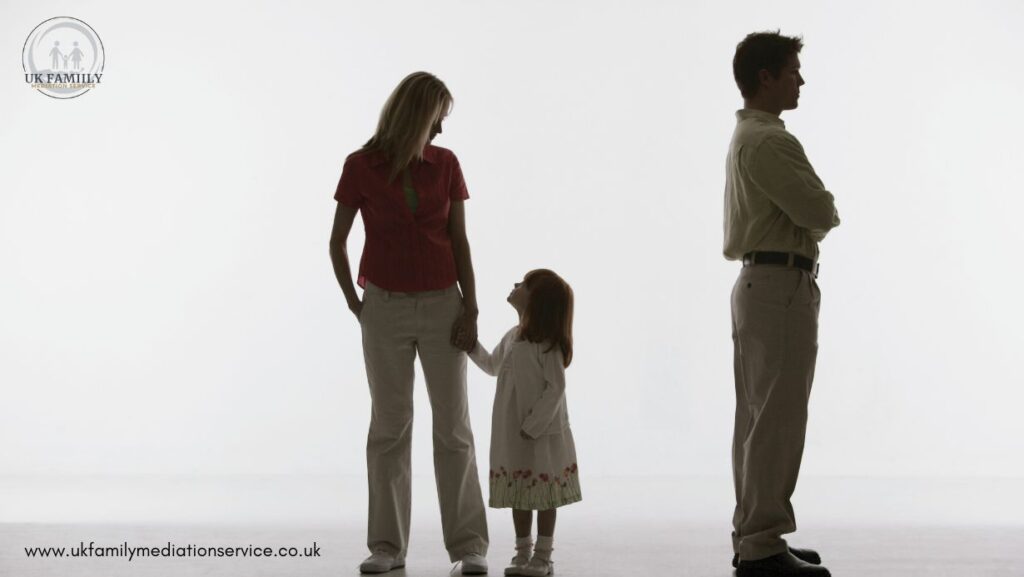Beginners Guide – Family mediation is a form of dispute resolution in which a neutral third-party mediator helps two or more parties involved in a family conflict reach an amicable agreement.
Unlike litigation, family mediation involves the parties themselves negotiating and deciding the terms of the agreement, which can help to build relationships rather than tearing them apart.
Mediators do not take sides or judge the parties involved but instead help them find common ground and craft solutions that are mutually satisfactory.

Mediation enables parties to explore solutions in a safe space. It allows each party to be heard and understood, whilst actively participating in finding a solution that benefits everyone involved.
It can prevent escalating conflicts and expensive legal proceedings in difficult situations.
Flexible outcomes are achievable because parties manage the decisions rather than being bound by court rulings; they may form practical agreements that can become legal contracts if needed.
This approach can be useful in situations such as child access cases or divorce proceedings. The process allows the parties to maintain control.
As a general rule, it is crucial for the parties to feel confident that they have obtained sufficient information to make informed decisions without incurring excessive costs.
Mediation is a process where a neutral third-party mediator helps divorcing couples discuss and resolve disputes related to their separation, such as property division, financial settlements, and child arrangements.
we will do it together
Family mediation lets you and your ex-partner (or another significant person), openly discuss co-parenting and financial separation with a mediator. Your mediator remains neutral throughout and helps you to agree on issues like children’s arrangements or separating finances without going to court.
Most people need between two and five family mediation sessions, each lasting around one to two hours. The exact number depends on the complexity of the issues.
Disputes involving only children may be resolved in just one or two sessions, while more complicated financial matters often take longer, especially if detailed financial information or expert advice is required.
UK Family Mediation offers a constructive and flexible approach to resolving child arrangements and divorce disputes, often leading to better outcomes in terms of cost, time, and emotional impact.
Understanding the mediation process and its benefits can help parents and separating couples make informed decisions leading to better co-parenting relationships and an amicable divorce.
If you have more questions or need assistance, consider speaking to our team today. Call 0330 010 1571 or contact us HERE.

How does Mediation help when getting divorced?
Divorce mediation is a collaborative process where a neutral third-party mediator assists divorcing couples in negotiating and reaching mutually agreeable solutions to various aspects of their separation.
This approach allows couples to address issues such as the division of assets, financial arrangements, and spousal support in a less adversarial and more cost-effective manner than traditional court proceedings.
Mediation provides a confidential and flexible environment where both parties can openly discuss their needs and concerns, fostering cooperation and reducing the emotional stress often associated with divorce.
Child access mediation, also known as child arrangements mediation focuses on resolving disputes related to child custody, residency, visitation, and co-parenting arrangements in the context of separation or divorce.
This prioritises the best interests of the child, providing a platform for parents (or grandparents or guardians) to collaboratively develop a parenting plan that supports the child’s emotional, physical, and developmental needs.
The mediator helps parties to navigate sensitive topics, such as living arrangements, school choices, holiday schedules, and communication methods, ensuring that the child’s welfare remains at the forefront of discussions.

Understanding your rights in mediation is crucial to ensuring a fair and effective resolution process.
You are entitled to a neutral and impartial mediator who facilitates discussions without bias or imposing decisions.
Both parties retain the right to to pause mediation to seek legal advice at any stage, providing clarity and confidence in negotiations.
Both parties have the right to confidentiality, meaning that what is discussed in mediation cannot be used against you if the case proceeds to court.
If family mediation is unsuccessful, you still have several options. These may include solicitor-led negotiations, family arbitration, or taking the matter to court.
Your mediator can provide a certificate that allows you to apply to court, but because mediation is confidential, discussions cannot be used as evidence. In most cases, courts expect you to attend a Mediation Information and Assessment Meeting (MIAM) before starting legal proceedings.
The UK Family Mediation team is able to help you with any questions you have. Call us now on 0330 010 1571
Our network of Mediators are available to offer specialist, neutral support for separating couples